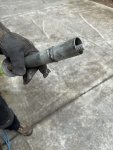My neighbor and I pulled the fuel tanks on his L6060 about 14 months ago because his tractor was stalling. We found rust from the untreated metal pickup assembly. There was rust debris and other trash in the tanks. We replaced the pickup assembly and filter after cleaning and reinstalling the tanks.
Fast forward to today... Tractor started stalling again. After being asked for help, I discovered some debris and a little slime in his water separator. We blew the lines out, recharged the separator, purged the air. Tractor ran fine for 35 minutes sitting still. A few minutes after putting the tractor in motion, it stalled. Not surprised.
To my neighbors credit, he changed some habits by buying new containers, a screened funnel, and replaced the fuel filter.
I suspect that scum to be the biggest culprit as the tractor is not stored undercover. I talked to him about treating his fuel.
Now the question. Have anyone reading this ever installed bung plugs in your fuel tanks for easy drainage and cleaning so as not to remove them? If so, how has it worked out? Parts used?
We are also going to install a screen type filter on the new (14 month old) fuel pickup to aid in keeping crap out of the fuel lines. Anyone ever done this before... experiences and parts used?
What fuel treatment works best to kill the scum?
I've owned two Kubota's over the last ten years and have very little problems with them. He is part-time helper in maintaining his son's farm. We're not long time professional tractor folks, just seeking some wisdom... please be Kind in your comments!
Fast forward to today... Tractor started stalling again. After being asked for help, I discovered some debris and a little slime in his water separator. We blew the lines out, recharged the separator, purged the air. Tractor ran fine for 35 minutes sitting still. A few minutes after putting the tractor in motion, it stalled. Not surprised.
To my neighbors credit, he changed some habits by buying new containers, a screened funnel, and replaced the fuel filter.
I suspect that scum to be the biggest culprit as the tractor is not stored undercover. I talked to him about treating his fuel.
Now the question. Have anyone reading this ever installed bung plugs in your fuel tanks for easy drainage and cleaning so as not to remove them? If so, how has it worked out? Parts used?
We are also going to install a screen type filter on the new (14 month old) fuel pickup to aid in keeping crap out of the fuel lines. Anyone ever done this before... experiences and parts used?
What fuel treatment works best to kill the scum?
I've owned two Kubota's over the last ten years and have very little problems with them. He is part-time helper in maintaining his son's farm. We're not long time professional tractor folks, just seeking some wisdom... please be Kind in your comments!



